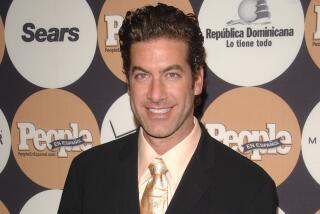A Futuristic Vision From Robert Ashley
Crossover is a well-known phenomenon in music, the journeying from classical into pop or vice versa. But at the CalArts Spring Music Festival on Monday afternoon, one heard, for the first time in these parts, about the Crossover Factor.
It is the side effect of applying Youth Salve, developed by the Fountain of Eternal Youth Foundation, to make an organism live forever. Every day, that organism will become something different. One day, maybe a likable black male of above-average intelligence who likes to cook dinner for his mate. The next, an ill-tempered, sullen white female who wouldn’t think of cooking for anyone.
This salve and its effects are described in the Nobel Prize acceptance speech of its inventor, a jazz musician from the future in Robert Ashley’s mini-opera “When Famous Last Words Fail You.”
This work is essentially an extended aria for baritone that lasts close to a half-hour. But it is also a radical indicator for opera of the future, a rethinking of the form from the ground up, as if Ashley were that musician making a Youth Salve for opera.
Ashley, who turns 68 in March, is a kind of William Burroughs of music; he only gets hipper as he gets older. Through a series of related works over the past two decades, he has connected opera with stream-of-consciousness poetry, with advanced forms of narrative and with new ideas about the nature of operatic ensemble. In “Last Words,” baritone Thomas Buckner sings/chants/recites Ashley’s solemn, hilariously convoluted--but also surprisingly eloquent and lyric--text about the danger of preserving life, of “knowing songs before they are sung.” Three other singers, Joan La Barbara, Sam Ashley and Jacqueline Humbert, offer amusing choral responses as sweet as ‘50s pop. The singers are amplified, and Tom Hamilton was at the switches, creating a golden sonic glow.
Originally written for the American Composers Orchestra, it was given Monday afternoon at the Roy O. Disney Music Hall for the first time with the ensemble reduced to strings and percussion, beautifully conducted by David Rosenboom, which created a quiet, vibrating halo of sound to support the singers.
*
A concert of Alvin Lucier’s music, also for these four extraordinary vocalists, was on the festival’s evening agenda, this time in the Walt Disney Modular Theatre. Lucier, like Ashley, is a composer who connects to the world. In his case, it is the science of acoustics. He might, as he did in two works Monday, ask singers to intone pitches very close to, but not identical with pure sine waves produced by an oscillator. The interaction of human and machine creates new kinds of sounds, intense and striking. He finds a sonic soul in objects, tapping on things you might find around the kitchen.
In one unforgettable piece, “Tyndall Orchestrations,” Humbert stood at one end of the darkened stage. Lucier was operating a Bunsen burner at the other. She sang in a squeaky high register as if imitating the sound of air being released from a balloon. The burner responded with sympathetic flickers.
In another, “Nothing Is Real,” Lucier played small, single line fragments from the Beatles’ “Strawberry Fields Forever,” on a piano and let them resonate into glossy distortion. Then he played them back through a tiny speaker in a teapot, the music coming from a distance, another kitchen object coming to life.
Lucier has found the poetry in acoustical science, but he has also found acoustical miracles in poetry. In “Theme,” the four singers deconstructed a poem by John Ashbury, reading into amplified vessels (one was a milk bottle, another an empty ostrich egg). Lines of poetry floated in a strange space. One of them--”that music has changed my life a lot since I made the mistake of hearing it”--especially rang true.
And yet CalArts did its unfortunate best to keep this music from changing lives. Its annual festival of contemporary music was once, in the early ‘80s, the most valuable in North America, but it gradually was phased out. This year’s return was like old times in the quality of music, but not in attitude. The publicity has been poor. And the very notion of scheduling an important Ashley premiere in the middle of the day Monday (in a hall that couldn’t accommodate all the students who wanted in, and without even a program), several hours before the evening concert, shows little concern for the music community at large.
The school also neglected to announce that its concerts are broadcast live over the Internet at https://shoko.calarts.edu/bitcast
*
* The CalArts Spring Music Festival continues through Saturday, CalArts, 24700 McBean Parkway, Valencia, and other venues. (818) 362-2315.
More to Read
The biggest entertainment stories
Get our big stories about Hollywood, film, television, music, arts, culture and more right in your inbox as soon as they publish.
You may occasionally receive promotional content from the Los Angeles Times.











